BMC Teammachine SLR 01 review
Our impressions of the newest arrival from the Swiss precision experts
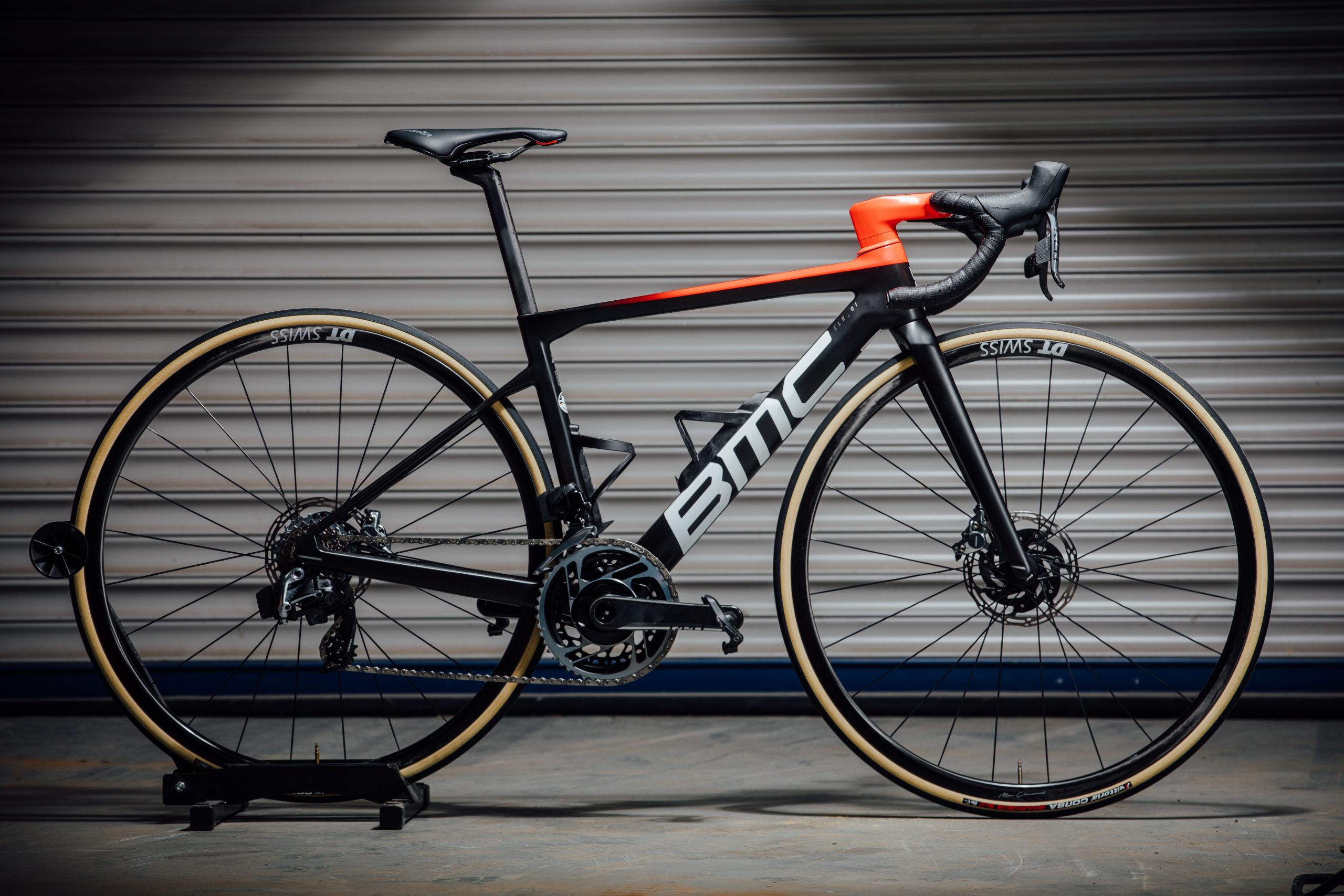
An extremely agile ride which climbs well, with aero credentials added for 2021. The increased stiffness is welcome in aiding power transfer and handling, and it's comfortable on smooth roads. When the tarmac gets bumpy, rigidity rears its head and we'd swap to wider tyres - or even look to the lower end frame models - for more comfort.
-
+
Excellent handling
-
+
Lightweight
-
+
Bottle cage design
-
-
Discrepancy in comfort
You can trust Cycling Weekly.
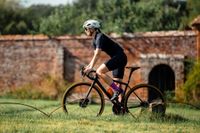
All of BMC's bikes are 'machines', a naming convention that makes sense considering the brand is renowned for feeding thousands of frame designs into its robotic software programme in order to achieve the desired ride.
The Teammachine is the road race rouleur of the stable, it's the bike all the GC players will be on and it's designed to perform in the mountains. But in keeping with almost every launch of its kind this year, it's had an aero update seeking to make it faster as well as lighter.
My relationship with this Teammachine goes back years; in 2015 I rode an early SLR model (then called the SLR02, denoting marginally less stiff and heavier carbon) on Swiss roads and that incredible ride placed it high in my regard for years to come. It was fast, responsive, and handled like a dream. Then earlier this year, I rode the third-generation SLR01 model, and was a little shocked to find the ride quality harsher than my memory served.
Now, I have on test the fourth-generation model year 2021 Teammachine.
This is the Teammachine SLR01 ONE, it comes in at £10,250 with SRAM Red eTap, featuring the top tier frame which is lighter and stiffer than the SLR options (once called the SLR02 family), which start from £2,700 - there's more detail on the differences here.
The latest race content, interviews, features, reviews and expert buying guides, direct to your inbox!
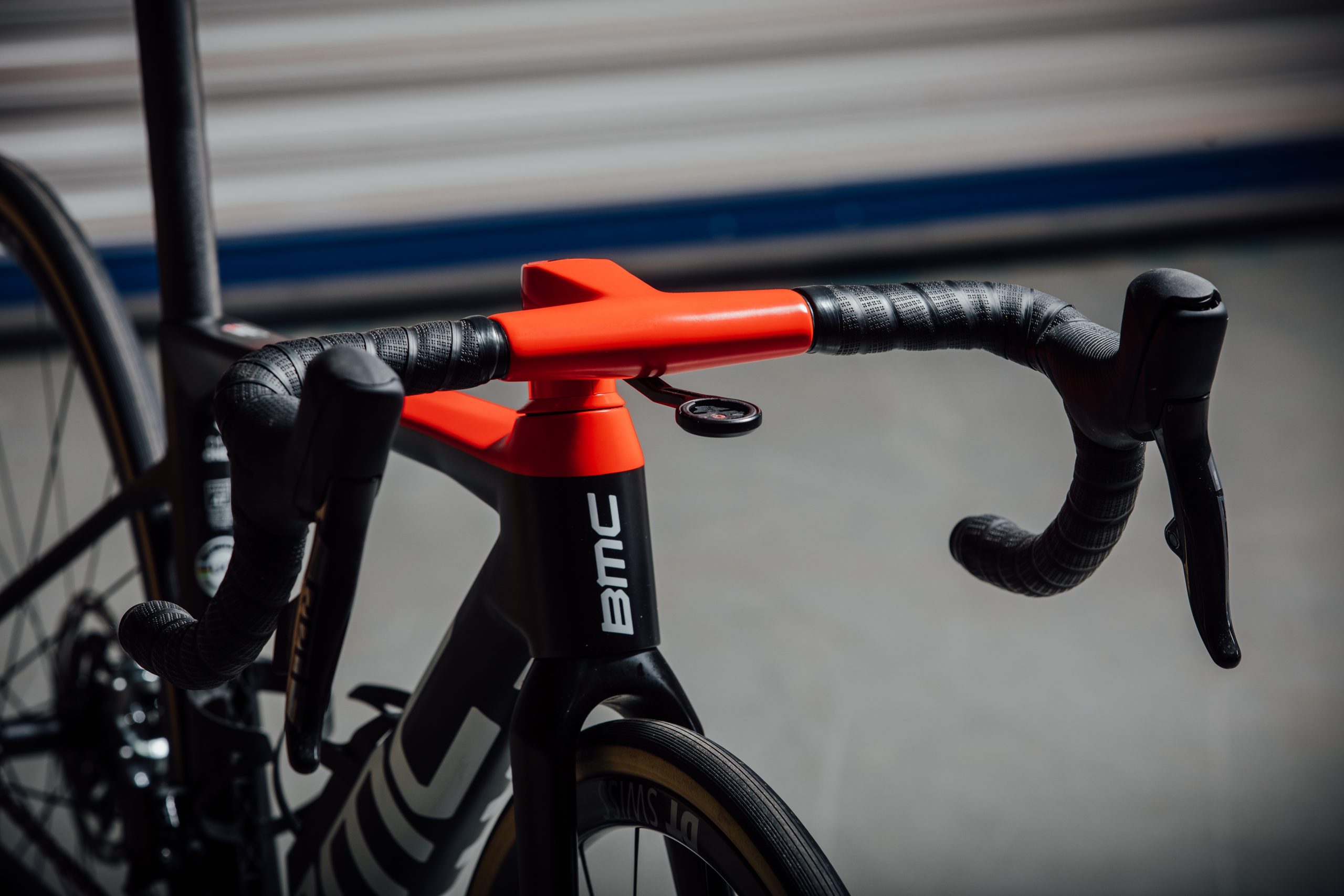
For 2021, BMC has sought to improve the aerodynamics of the bike, decrease the weight, and increase the stiffness.
Aerodynamically, it's a reported six percent faster. The six percent is an average of how much faster a group of pro riders were on average when lapping the velodrome at 45kph - some were only two percent faster, others nine - but they all went faster.
Updates include an increase in the surface area of the downtube, which has a re-designed profile, aero-ised fork legs (with notes taken from the Timemachine) and stealth thru-axle nuts.
Reportedly, pro team mechanics also wanted the wheels to be easier to remove and re-fit. Having punctured on a ride I can attest that the system worked well (no proprietary "if it ain't broke don't fix it" axle styles here!).
The SLR 01 ONE model also sports the ICS handlebar and stem duo. It's an integrated system, which spells more aero savings, but it can also spell trouble for home mechanics. However, in true Swiss style, the cable routing is very well designed - it's a bit like fitting a jigsaw together, as long as you know where the right bits go and you have the patience to put them there, you're ok - just don't expect it to be a quick job.
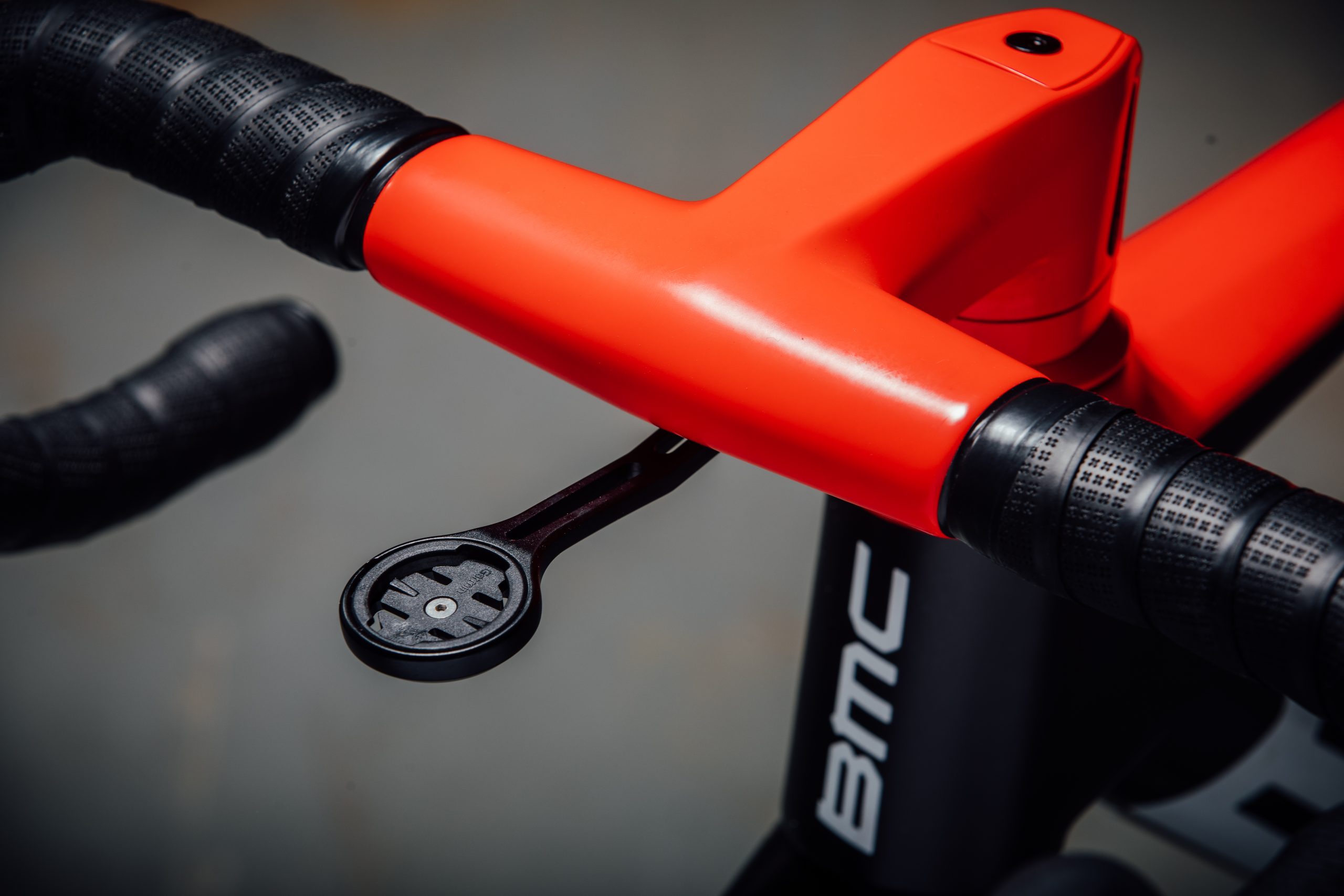
It's quite easy to twist the bars for travel, with the stem bolts easy to access underneath a flippable cover. However, tellingly, my bike did arrive in a BMC box with the bars straight so I'm not sure how healthy cables would be after twisting the bars over long durations.
The bars come in widths of 40 and 42cm - that sounds wide to me, but mine measured 38cm from centre to centre, and felt in-keeping with my preferences. As ever, with an integrated set up, it's worth checking if your dealer will swap the bar width free of charge should you need it.
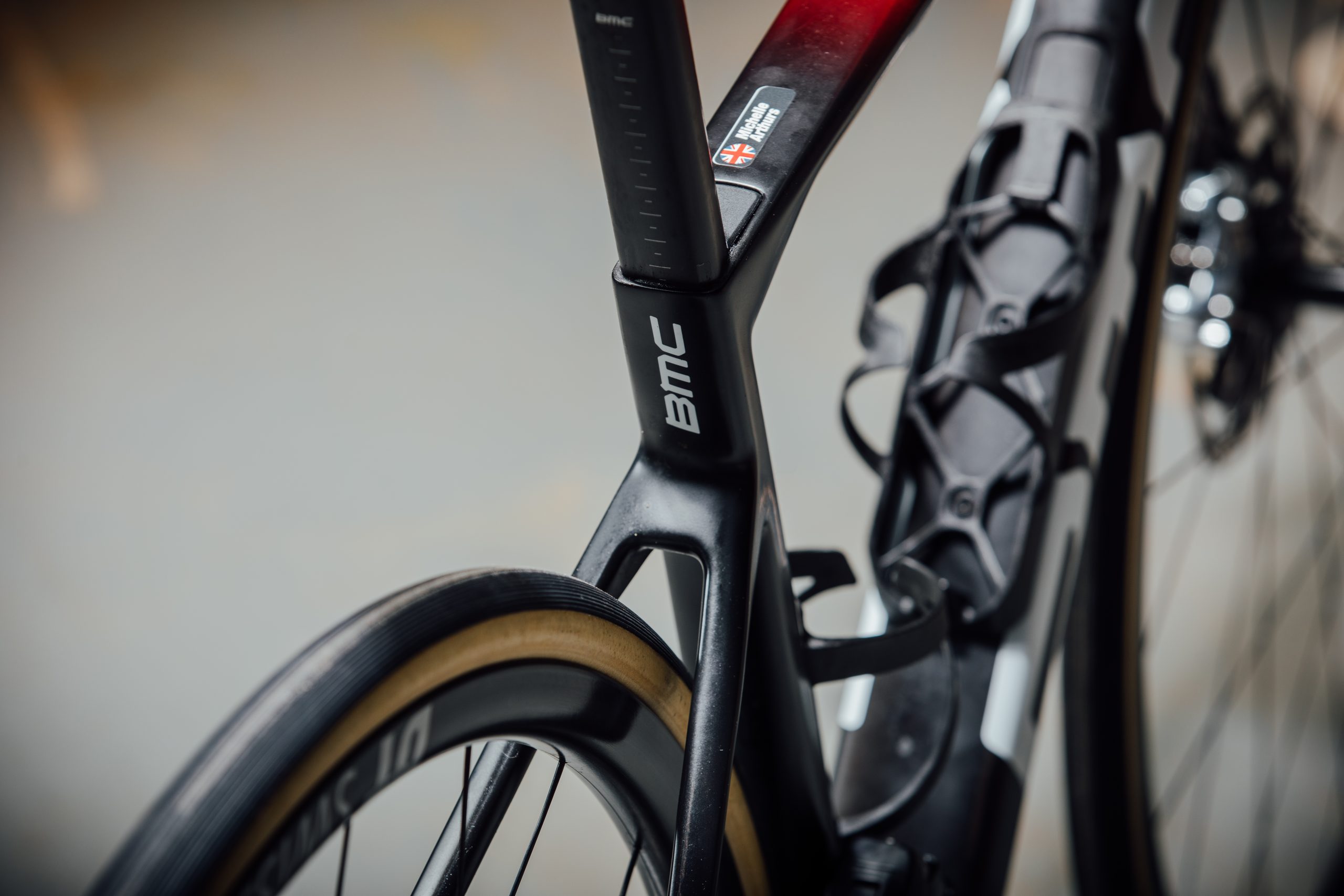
More aero nods come from the Aerocore bottle cages - these look a bit funky but worked well, and they make sense - why make the downtube aero then stick a less unoptimised bottle cage on it?
This Teammachine SLR 01 is a reported nine per cent lighter than the model it replaces. Weight has been shaved off primarily at the fork legs, handlebar/stem duo and D-shaped seatpost. the claimed weight of a 54 is 6.5kg, though I have the 49 on test and got 6.61kg (it's possible BMC weighed the bikes without cages, bar tape, etc). Focusing on the frame only a 54 is a claimed 820g with a 345g fork and 185g seatpost.
Finally, on the 2021 updates, BMC has made this bike 20 per cent more laterally stiff, aiming to improve the handling - a request from the pros, reportedly. It's 'less than five per cent' more vertically stiff, and BMC says touches like adjusting the seatpost layup actually lead to more comfort.
>>> Is a stiffer frame always faster?
Onto the gubbins of the spec before we talk about the ride: BMC has opted for a PF86 bottom bracket, bucking the trend for swapping over to threaded to appease home mechanics. The wheels are DT Swiss' PRC1100 DB Dicut Mon Chasseral hoops, and these come wearing Vittoria Corsa G2 25mm tyres. This model is dressed in SRAM eTap, but those running Di2 can place the junction box in the downtube - it's got a neat little hidey hole.
The ride
The defining feature of the Teammachine for me has always been its handling - this bike is go-kart quick in the bends. In fact, I'll confidently say it's the best handling bike I've ridden all year.
My size 47 came with a stack of 506mm, with a snappy 968mm wheelbase and headtube angle of 71.5°; a -12.5° stem angle helped me get low over the front end.
At 6.6kg, it's light - lighter than the UCI weight limit of 6.8kg (without pedals), so frankly there's not a lot of point in a brand with such a strong racing background looking to drop any lower.
I live in a valley, so there's plenty of up - and I felt fast climbing the 20 per cent slopes to get out into Kent. If you want details, I was a meagre three seconds slower over my regular eight-minute test climb when compared with my time riding the Canyon Ultimate Evo (weighing 5.98kg) with a raging tailwind. Now, obviously the rides were on different days, in different conditions but it gives you a flavour.
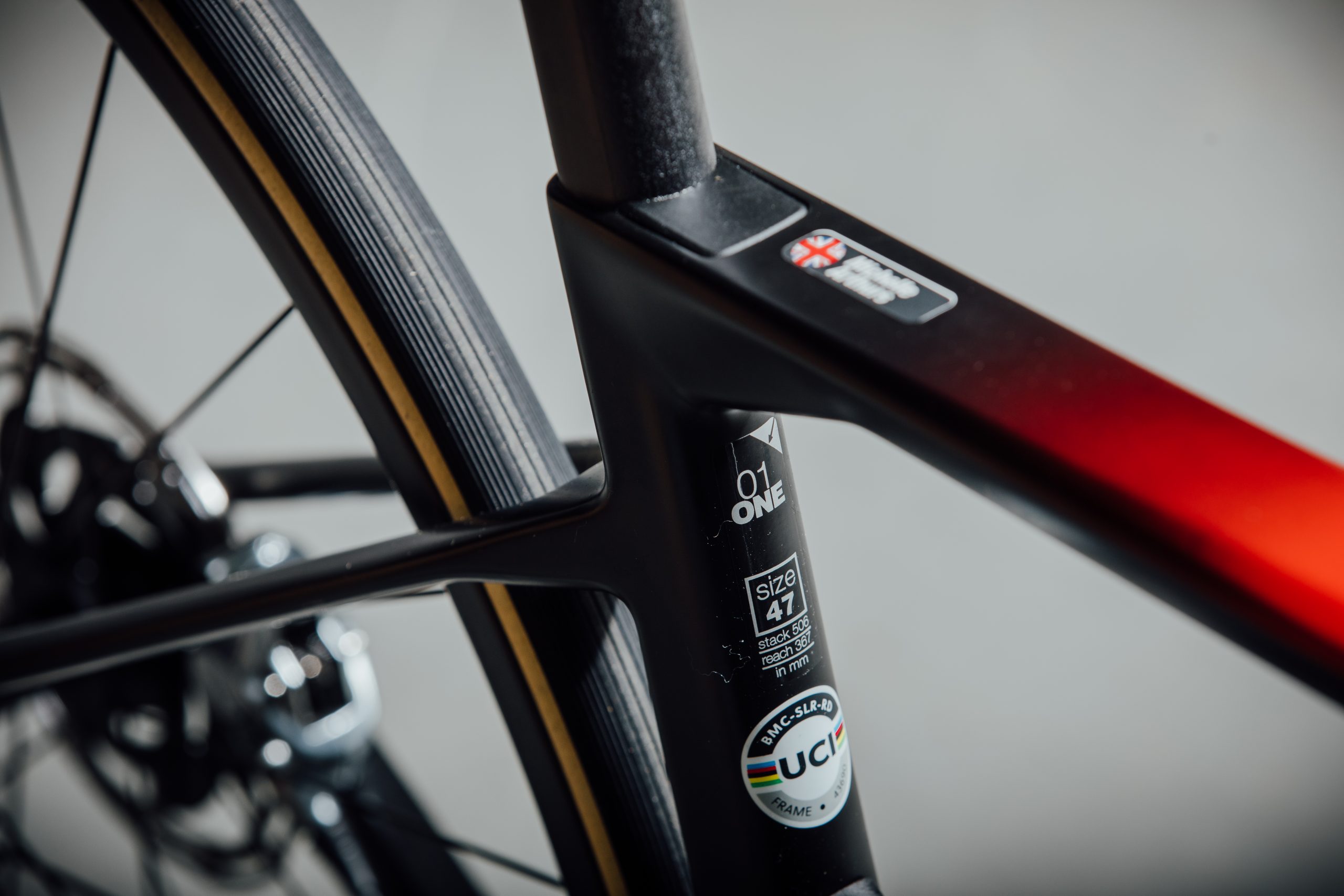
When I rode the outgoing Teammachine SLR01, I already thought it was pretty stiff. Now, it's been made stiffer. The brand claims that this increase is mostly around the bottom bracket and handlebars, adding to the responsiveness and great handling, whilst compliance has actually been increased via the adjusted carbon layup.
However, for me, riding the size 47 frame I found a large discrepancy between the bike's performance on smooth roads vs rutted lanes. On good roads, it had a magic carpet quality, I was comfortable and I felt fast. However, as soon as I hit broken road, I was transformed into a sack of potatoes bumping along the road.
I did try riding the bike at a lower pressure, and swapping on a Pirelli PZero 25mm tyre (a tyre I know well), but to little effect. I didn't have a chance to swap on a set of 28mm tyres before the bike had to go back, and I'd suggest that doing so could well make all the difference. There's clearance for up to 30mm tyres. It's also worth noting that it's very easy to make a short tube stiff (and very easy to make a long tube flexy) - so my 47 might be less comfortable than a larger size for a larger, heavier rider.
BMC's Teammachine isn't alone in eliciting this reaction, the Giant TCR got an aero update this year and out tester found the top-end model a bit clattery (review of the lower end model coming soon). The effect of increasing tubing diameters is such that making a bike more aero will often result in a decrease in compliance.
There's an awful lot that I absolutely loved about this bike - its handling, comfort on the good roads, and lightweight chassis were all up there in my good books. The clear distinction in comfort levels pending road quality knocked my confidence in its prowess.
If you're after a light, fast, all-out race machine, comfort may not be on your wishlist. In that case - this could be a great bike for you.
If you, like me, believe that being comfortable on a bike will make you faster over longer distances, I'll wager that the clatter could be addressed by swapping the bars for a less rigid, round model (with the ICS2 stem) and opting for a 28mm tyre. Alternatively, you could save yourself some pennies and try the lower end SLR frame (previously the SLR02) which features a slightly different layup and already comes with round bars.
Michelle Arthurs-Brennan the Editor of Cycling Weekly website. An NCTJ qualified traditional journalist by trade, Michelle began her career working for local newspapers. She's worked within the cycling industry since 2012, and joined the Cycling Weekly team in 2017, having previously been Editor at Total Women's Cycling. Prior to welcoming her first daughter in 2022, Michelle raced on the road, track, and in time trials, and still rides as much as she can - albeit a fair proportion indoors, for now.
Michelle is on maternity leave from April 2025 until spring 2026.
